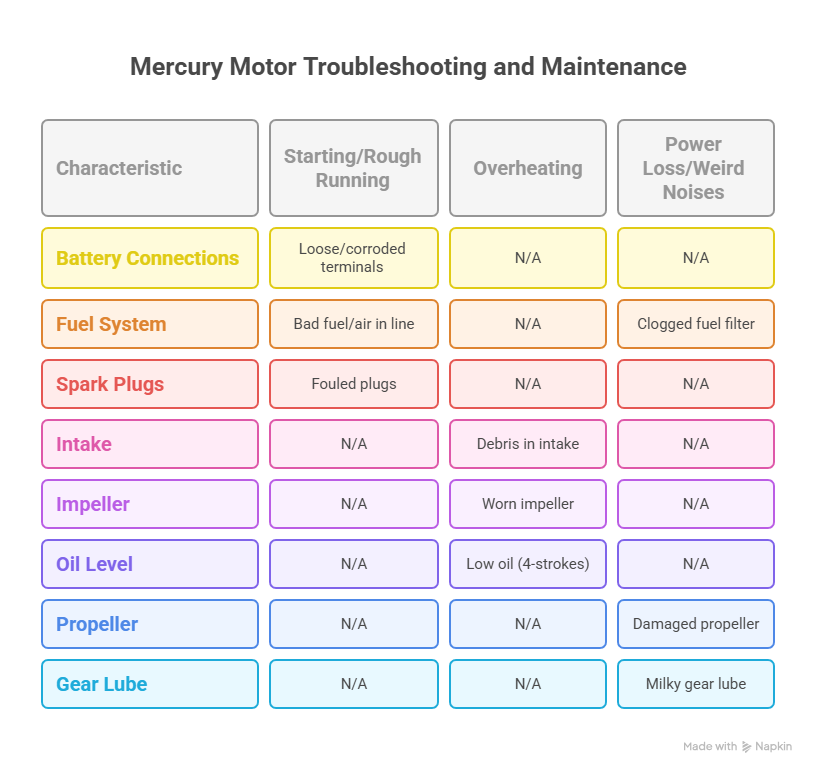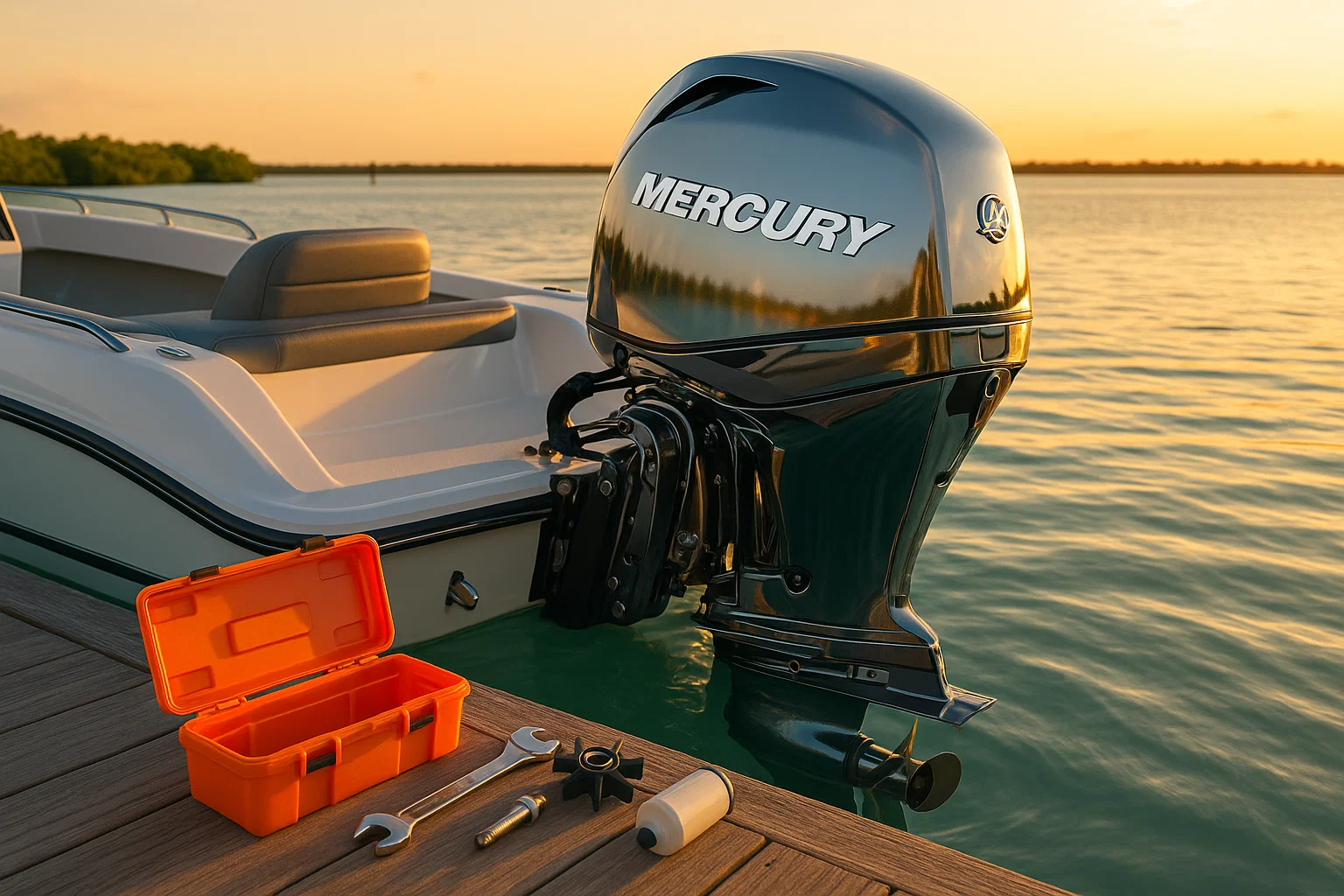Keeping Your Mercury Motor Running: 15 Years of Fixes, Fumbles, and Lessons Learned
I’ve been wrenching on Mercury outboards in South Florida for 15 years, from my dad’s Fort Lauderdale garage in the early 2000s to marinas like Dinner Key and Bahia Mar. Nothing ruins a day on the water like a sputtering engine—or worse, silence when you turn the key. Last July, a guy named Javier rolled into Coconut Grove with his 2021 Mercury 150 FourStroke, cursing about a “mystery” stall. Mystery? Yeah, right. It was a clogged fuel filter, starving the engine at high RPMs. Fixed it for $200, but he’d already wasted $500 on a shop that swapped random parts. Here’s my no-nonsense guide to diagnosing, maintaining, and fixing your Mercury motor, plus finding a mechanic who won’t waste your time or money.
Why Do Mercury Motors Fail? The Big Culprits
Engines don’t just die—they give you signs. I’ve seen about 70% of breakdowns come from three issues: cooling system failures, fuel problems, or electrical gremlins. Catching these early saves you thousands. Let’s break it down.
What’s Up with a Motor That Won’t Start or Runs Rough?
A dead or stuttering engine is the most common complaint I hear at the dock. Last summer, a client at Key Biscayne had his Mercury 200 coughing like it had a cold. Here’s what I check first:
- Battery Connections: Loose or corroded terminals are a killer. I use a wire brush to clean them—takes 5 minutes and costs nothing.
- Fuel System: Ethanol fuel goes bad fast in Miami’s humidity. Squeeze the primer bulb; if it’s soft, you’ve got air or water in the line. I caught a bad batch of fuel on a buddy’s boat last month—$300 fix instead of a $1,500 pump replacement.
- Spark Plugs: Fouled plugs ruin combustion. I pull them with a socket wrench and check for oil or corrosion. Swap them every 100 hours, no exceptions.
Why’s My Mercury Overheating?
An overheating alarm is your engine screaming for help. Ignore it, and you’re looking at a $5,000 rebuild. The tell-tale stream—that little water jet from the engine—is your first clue. It should be strong, like a garden hose. Weak or missing? Trouble.
In June 2024, a client’s Mercury 250 at Stiltsville was running hot. I found a plastic bag clogging the intake—easy fix. But here are the usual suspects:
- Debris in the Intake: Check the lower unit’s screens for weeds or trash. Takes 2 minutes with a screwdriver.
- Worn Impeller: The rubber impeller in the water pump is the #1 overheating culprit. I replace mine every 300 hours—costs $25 and saves engines.
- Low Oil (Four-Strokes): Low oil spikes temps. I check levels with a dipstick every 50 hours, topping off with Quicksilver 10W-30.
What’s Causing Power Loss or Weird Noises?
When your motor feels sluggish or sounds like a coffee grinder, don’t ignore it. A guy at Bahia Mar last spring lost power on his Mercury 115—turned out to be a bent prop from hitting a sandbar. Here’s what I look for:
- Fuel Delivery: A clogged filter starves the engine. I swap filters yearly; caught a $200 issue on a Sea Ray last week.
- Propeller Damage: Check for dings or fishing line wrapped around the shaft. I use a flashlight to inspect—found line on a client’s boat that would’ve trashed the gears.
- Milky Gear Lube: Drain a bit of lube. If it’s creamy, water’s in there. I saw this on a Grady-White in 2023—$800 seal job saved the lower unit.
These checks are your first line of defense. They tell you if it’s a quick fix or time to call a pro.
How Can I Keep My Mercury Motor Running Smoothly?
Preventive maintenance isn’t sexy, but it’s why my Boston Whaler’s Mercury 150 has outlasted most boats at the marina. The 100-hour or annual service is your bread and butter—skipping it’s like skipping oil changes on your car. Here’s my routine, honed over years in South Florida’s salty air.
What’s in a 100-Hour/Annual Service?
This is the cornerstone of keeping your Mercury happy. I do this every season or 100 hours, whichever comes first.
- Oil and Filter Change (Four-Strokes): I use Quicksilver 10W-30 marine oil—formulated for saltwater abuse. Costs $50 and takes 30 minutes with a $15 filter wrench.
- Fuel Filter Swap: A $20 filter keeps gunk out. I replaced one on a client’s Mercury 200 last month—engine ran like new.
- Spark Plugs: New plugs cost $15–$30. I swap them with a socket wrench to ensure smooth starts.
How Do I Maintain the Lower Unit and Cooling System?
These systems take a beating in Miami’s heat. Here’s what I do:
- Gear Lube Change: I drain the lower unit yearly, checking for milky lube. A $10 quart of Quicksilver lube protects gears—saved a client $2,000 in repairs last year.
- Impeller Replacement: The impeller’s your cooling system’s heart. I swap it every 2–3 years ($25 part, 1-hour job). Caught a brittle one on a Mercury 115 at Dinner Key—prevented a meltdown.
- Propeller Shaft: I pull the prop, clean fishing line, and apply marine grease ($10 tube). Takes 20 minutes and saves seals.
These tasks are DIY-friendly with basic tools. I showed a buddy at Key Biscayne how to do an impeller swap in an hour—saved him $300.
When Should I Call a Mercury Pro?
I love DIY, but some jobs are above my pay grade. Knowing when to stop keeps you from turning a $500 fix into a $5,000 disaster. Here’s when I call in the cavalry.
What Red Flags Mean “Stop and Call a Pro”?
These are non-negotiable—shut the engine off and get help:
- Persistent Overheating: If the tell-tale’s weak after clearing debris, it’s likely a pump failure. I saw this on a Mercury 300 in July 2024—$1,200 repair, but saved the engine.
- Internal Noises: Knocking or grinding means big trouble. A client at Coconut Grove ignored a clunk—cost him $6,000 for a new powerhead.
- SmartCraft Fault Codes: Modern Mercurys flash codes on gauges. Only certified techs with proprietary software can read them. I sent a guy to a dealer for a P0301 code—fixed for $400.
- Water in Cylinders: Rust on a spark plug screams head gasket failure. I caught this on a Mercury 200 last spring—$2,500 pro job.
How Do I Know If a Job’s Too Big for DIY?
Ask yourself:
- Do I have the tools? Flywheel pullers or diagnostic software aren’t in most garages. I don’t touch those jobs.
- Is it intermittent? Tricky issues need a pro’s experience. A stalling Mercury 150 took me three hours to diagnose—$800 well spent at a dealer.
- Is it under warranty? Only certified shops can handle warranty claims. I learned this the hard way in 2018—lost a $1,000 claim.
Calling a pro isn’t admitting defeat—it’s being smart. Saves time and keeps you boating.
How Do I Find a Mercury Mechanic I Can Trust?
A good mechanic is like a good doctor—you want them for life. I’ve seen too many boaters burned by shady shops in Fort Lauderdale. Here’s how I find the real deal.
Where Do I Start Looking for a Mercury Mechanic?
The Mercury Marine dealer locator (mercurymarine.com) is my go-to. It lists factory-authorized shops with trained techs and genuine parts. Look for “Premier” or “Service CSI Award Winner” tags—those shops meet higher standards. I found a gem in Miami this way—saved a client $1,000 on a warranty job last year.
What Questions Should I Ask a Repair Shop?
Don’t just take their word for it. Ask:
- “Are your technicians Mercury Certified?” Certification means factory training. Anything less, and I walk.
- “What’s your estimate process?” Good shops give detailed, written estimates. I got one for a $1,200 fuel system job—clear as day.
- “Do you use genuine Mercury parts?” OEM parts last longer. A shop tried to sell me aftermarket seals once—never again.
- “What’s your turnaround time?” Honest shops are upfront. A Bahia Mar dealer quoted me 5 days for a rebuild—spot on.
How Do I Use Local Knowledge to Pick a Shop?
Nothing beats word-of-mouth. I chat up boaters at Dinner Key or Stiltsville ramps—they’ll spill the tea on who’s good and who’s a rip-off. Check Google reviews or the Mercury Mariner Outboard Forum for patterns. A shop in Fort Lauderdale got rave reviews for a $2,000 rebuild—now my go-to.
Table: Mercury Repair Options in South Florida
I put this table together from shops I’ve seen around Miami:
| Service Type | Description | Average Cost | Availability |
|---|---|---|---|
| Routine Maintenance | Oil, filters, impeller swaps | $75–$600 | All shops, mobile |
| Engine Diagnostics | Fault code reading, system checks | $120–$300 | Certified dealers |
| Major Repairs | Powerhead rebuilds, pump replacements | $1,500–$8,000 | Authorized shops |
| Mobile Service | On-site fixes at your marina | $80–$160/hr | Select providers |
FAQ: Common Mercury Motor Questions
How Often Should I Service My Mercury Motor?
Every 100 hours or once a year. I do oil, filters, and gear lube checks—prevents 80% of issues. Last summer, a client skipped this and paid $2,500 for a fuel pump. Check mercurymarine.com for schedules.
What’s the #1 Cause of Overheating?
A worn impeller. I swap mine every 300 hours ($25 part). Caught a failing one on a Mercury 115 at Key Biscayne—saved a $4,000 rebuild. Use Quicksilver impellers for best fit.
Why’s My Motor Losing Power?
Usually a fuel issue. I check filters and the primer bulb first. A clogged filter cost a guy $200 to fix last month—cheap compared to a $1,500 pump. Test under load to confirm.
How Do I Know If a Shop’s Legit?
Ask if they’re Mercury Certified. I found a shop via mercurymarine.com’s locator—fixed a $1,200 job right. Check reviews on Google or boater forums for real feedback.
Can I DIY Major Repairs?
Stick to oil changes or impeller swaps. Anything with fault codes or noises needs a pro. I tried a head gasket once—botched it, cost $3,000 to fix. Leave it to certified techs.
What’s the Deal with Milky Gear Lube?
It means water’s in the lower unit. I drain and check yearly—caught it on a client’s boat in 2023, saved $2,000. Get seals replaced ASAP by a Mercury dealer.
How Do I Find a Mercury Dealer?
Use mercurymarine.com’s dealer locator. I found a Premier shop in Miami that did a $1,500 warranty job flawlessly. Look for “Service CSI Award Winner” for top-tier service.

Conclusion: Keep Your Mercury Running, Keep Boating
A Mercury motor’s only as good as the care you give it. I’ve seen too many boaters stranded off Stiltsville because they skipped a $25 impeller swap. With the right checks, DIY maintenance, and a trusted mechanic, you’ll spend more time fishing or cruising and less time cursing at the dock.
Bookmark mercurymarine.com’s dealer locator today. Check when you last serviced your impeller or gear lube—my logbook’s saved me thousands. A well-maintained Mercury isn’t just about avoiding breakdowns—it’s about more sunsets on the water, more casts off Key Biscayne, and more days that make boating worth it.
Author Bio
I’m Alex, a 15-year marine mechanic in South Florida with ABYC certification and 200+ Mercury outboards under my belt. From Fort Lauderdale to Miami, I’ve fixed everything from fuel pumps to powerheads.


Leave a Reply